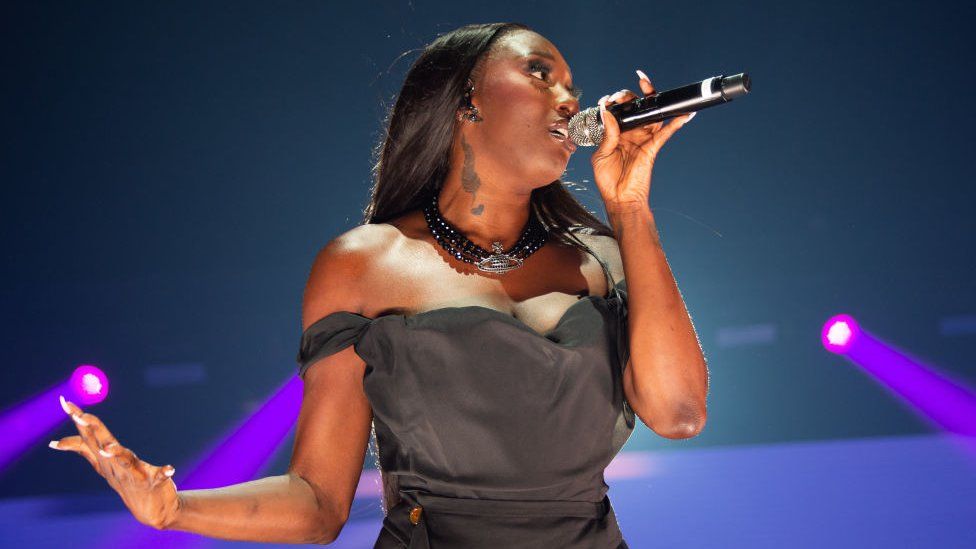ARTICLE AD BOX
 Image source, Joseph Okpako/WireImage
Image source, Joseph Okpako/WireImage
Aya Nakamura came to France as a child and mixes upbeat Afropop, R&B and Parisian street slang
By Hugh Schofield
BBC News, París
She may be the most listened-to French female singer in the world, but is Aya Nakamura the right fit for the Paris Olympics?
President Emmanuel Macron's reported idea that the 28-year-old Franco-Malian singer perform at the opening ceremony in July has sparked an almighty row in France about identity and language.
On one side are ranged her supporters, who say there could be no better way of showcasing the vibrancy of modern-day Francophone culture - a culture that revels in its diversity.
On the other are the detractors, who say her music owes more to Africa and the United States than it does to France - and that her use of the French language only debases it.
The arguments, over an invitation that it is still only hypothetical, spilled onto social media, after her name was booed at an election rally of the far-right Reconquest party.
A small far-right group called Les Natifs (Natives) posted a picture of themselves online with a banner reading: "No way Aya. This is Paris, not the market at Bamako."
This prompted a response from the singer on Twitter/X: "You may be racist but you're not deaf. That's what hurts you. I'm the number one subject of state in debates ect (sic), but what do I owe you? Nothing."
Ministers, fellow musicians and the Olympics organisers have rushed to Nakamura's defence, accusing her opponents of rejecting her because of her foreign origin.
Reuters
Beware of pretexts for using pure racism to attack someone. Targeting an artist for what she is, is unacceptable, it's a crime
Nakamura was born in Bamako in 1995 under the name Aya Danioko, in a family of griots - traditional musicians and story-tellers. A few years later they came to the high-immigration Paris suburb of Aulnay-sous-Bois, where she went to school.
She changed her name to Nakamura after a character in the TV series Heroes, and in 2014 launched her career. With four albums to her name and a host of singles, she is regularly referred to as one of the most important figures on the French music scene.
Most importantly, Nakamura sells abroad. Where so many other French singers, of all kinds, have had to content themselves over the years with solely French-speaking audiences, Aya Nakamura has performed the rare feat of breaking through across the globe.
For President Macron, this is the strongest argument for inviting her to the Olympics.
According to the unconfirmed reports, she would sing a chanson of the late Édith Piaf - thus updating a French classic and showing it off before a modern, multi-ethnic worldwide audience.
Image source, Michael Ochs Archives
Image caption,Édith Piaf achieved international recognition for her trademark French chansons
Curiously though, a majority of the French public appears to disagree.
An Odoxa poll taken after the story broke found that, though Nakamura is extremely well-known with 80% recognition, only 30% of those asked had a good opinion of her.
Some 73% of those who knew her music said they did not like it, and a clear majority of 63% said she should not sing at the Olympics opening.
The most vocal criticism has come from Marion Maréchal of the Reconquest party, who said: "Like her or not, the fact is - this singer doesn't sing in French."
Interviewed on French television, Ms Maréchal said the decision to invite Nakamura, assuming there has been one, was political. "They have deliberately chosen to show a multicultural France … [But Nakamura] does not represent the French language."
Image source, Victor Boyko/Getty Images
Image caption,Aya Nakamura is 28 and already has four albums to her name
About a man who spreads sexual lies about the singer, the song's chorus in French goes: "Y a pas moyen, Djadja. J'suis pas ta catin, Djadja, genre, en catchana baby, tu dead ça"
Which roughly translates as: "No way, liar-boy. I'm not your whore, like [sexual reference] baby, good job!"
Paul Verlaine it ain't, which is presumably why a majority of the French public appears to agree with Marion Maréchal that Nakamura would be unsuitable as a standard-bearer of French language and culture.
The counter-arguments are first that Nakamura would not be singing her own composition, but Édith Piaf.
But more important is the fact that Nakamura has been successful in France, a positive sign of integration, and she has influence with young people all over the world.
Her language may be innovative. But at its core it is, after all, French.

 1 year ago
41
1 year ago
41








 English (US) ·
English (US) ·